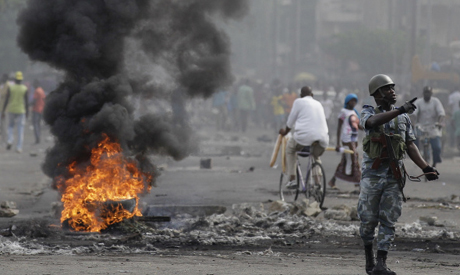
A soldier shouts to supporters of opposition candidate Alassane Ouattarain the Koumassi neighborhood of Abidjan, Ivory Coast, Monday 6 December 2010. (AP)
Ivory Coast authorities extended a nightly curfew by one week to 13 December, an official announcement on state television said on Monday amid a political crisis following disputed elections.
"In order to maintain public order a curfew is enforced on all national territory" from 10pm to 6am (2200 to 0600 GMT) each night up to and including next Monday," the statement by authorities loyal to Laurent Gbagbo said.
Outgoing president Laurent Gbagbo had introduced the curfew on the eve of the 28 November runoff vote which saw deadly violence between rival supporters. Gbagbo and his rival Alassane Ouattara have both sworn themselves in as president and each pressed on as if he was in charge, naming separate prime ministers despite a mediation bid by South Africa's former president Thabo Mbeki.
Fears of civil war and the threat of sanctions loomed in Ivory Coast Monday as international mediators tried to settle a political crisis between two powerful rivals claiming the presidency.
The ex-rebel chief named prime minister in a new rival government, Guillaume Soro, warned incumbent Laurent Gbagbo he could face an armed revolt, while the European Union threatened sanctions if the crisis is not settled fast.
Soro, Gbagbo's former prime minister who has been reappointed to the job by Ouattara and has several thousand northern rebel troops behind him, warned Gbagbo Monday they could take up arms if he clings on. Gbagbo has nominal control of the national army.
Asked whether he would be ready to reactivate his forces to "unseat" Gbagbo, Soro told France's Europe 1 radio: "If he pushes us to it, we'll have no other choice," but insisted he was seeking a peaceful outcome.
"There must be a transition of power," said Soro, who became Gbagbo's prime minister under a 2007 accord with the northern rebels. "There's no question of dividing Ivory Coast."
The crisis "is obviously very serious", Mbeki told reporters on Sunday. "Among other things, it's important not to have violence, not to return to war and so on, to find a peaceful solution."
An AU source said Mbeki stayed the night in Abidjan and held further meetings with Ivorian officials on Monday morning but there was so far no word from the mediator.
Hundreds of people fearing violence meanwhile began crossing west from parts of Ivory Coast controlled by Ouattara's supporters into neighbouring Liberia, an official there said.
Despite an earlier order by Gbagbo for Ivory Coast's borders to be sealed, "there are more than 300 Ivorians who have already crossed the borders into Liberia", the top Liberian official for refugees, Saah Nyumah, told AFP.
At least 17 people have been killed in election-related clashes in Ivory Coast in the past two weeks and there have been unconfirmed reports of other violence around the country.
"It could take several months but if there is still no political solution we cannot rule out a real risk of a return to an armed conflict," said Gilles Yabi, a senior regional analyst at the International Crisis Group.
Short link: